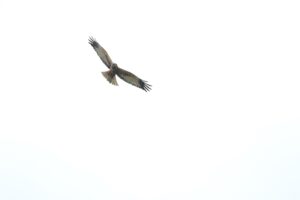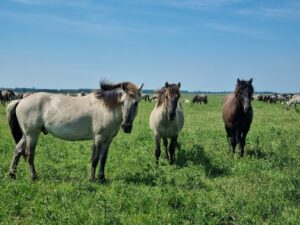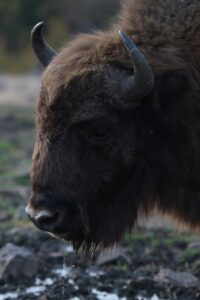Shifting Baseline Syndrome, impacts on nature conservation and prevention – Margaux Pierrel
Margaux Pierrel beside an old oak tree at the heart of Knepp (UK).
Margaux Pierrel is one of the 2022 Alfred Toepfer Scholarship winners. In this article, she details what she’s learned about Shifting Baseline Syndrome during her study trips. You can find her full report at the end of this article.
Article issued by Margaux Pierrel
About shifting baseline syndrome

Marsh harrier at Wild Ken Hill (UK) © Margaux Pierrel
Shifting baseline syndrome (SBS) is a psychological and sociological phenomenon describing a gradual change in the accepted norms for the state of nature due to a lack of memory, knowledge or experience of its past condition. In other words, SBS is the situation in which each new generation consider the state of nature when they were born and raised as the normal or healthy baseline. As a dual climate and biodiversity crisis unfolds, this results in a continual lowering of people’s accepted thresholds for the ‘normal’ state of nature.
SBS is therefore an aggravating factor to the environmental deterioration and decline of species; as well as one of the major obstacles to nature protection and climate justice.
Presently working as a conservation ranger in Ireland, I face the consequences of SBS in my daily activities, from law enforcement to site monitoring, through environmental education. Thanks to the Alfred Toepfer Natural Heritage Scholarship, I was able to learn more about the implications of SBS on nature conservation in European protected areas, with the objective of understanding better this relatively unknown phenomenon and how it affects the professional sector.
In order to do so, I carried out five study visits in European protected areas in 2023. The visited sites were Wild Ken Hill (UK), Oostvaardersplassen Nature Reserve (Netherlands), Knepp (UK), Mercantour National Park (France) and Rewilding Rhodopes (Bulgaria).

Konik horses at Oostvaardersplassen Nature Reserve (Netherlands), Margaux Pierrel
Why should SBS be considered in conservation?
As developed in my report, there are three main causes of SBS:
- the lack of scientific data on past conditions,
- the extinction of experience (i.e. lack of interaction and orientation for nature),
- the loss of familiarity with nature, leading to people’s incapacity to assess an environment and thus notice change.
SBS has several consequences, of which some are aggravating factors of SBS (i.e. ‘feedback loops’). These include a gradual habituation to degraded natural environments and altered expectations for the state of nature (i.e. what is worth protecting or not).
The professional sector of ecology and conservation is not exempted from these consequences, and other implications can develop such as ‘conservation complacency’ where policymakers may set inappropriate or less ambitious targets for environmental conservation, restoration and management programs due to false perceptions of past environmental conditions. SBS can also result in a lack of consideration for alternative historical data, leading to a knowledge loss from generation to generation.
Suggestions on how to prevent SBS and reverse the shift

Bison reintroduction in Rewilding Rhodopes (Bulgaria), Margaux Pierrel
Thanks to research and interviews with experts during my study visits, I have highlighted four suggestions or ‘treatments’ against SBS:
- Reversing SBS must pass through the restoration of the natural environment and rewilding, where conditions allow.
- A (re)connection with the natural environment should be encouraged by and for everyone, since tuning in with nature will enable people to start noticing change again, therefore giving people a sense of belonging and the wish to protect what they know.
- Access to robust monitoring data should be made available for all professionals, this data should be saved on a safe and accessible interface and should be used to inform conservation objectives and strategic plans for protected areas.
- An emphasis should be given to environmental education, for all age groups, and across rural and urban areas, as well as designated for professionals thanks to workshops and partnerships.
This Alfred Toepfer Natural Heritage Scholarship offered a fantastic opportunity to expand my knowledge and experience of Shifting Baseline Syndrome and its effects on European nature conservation. I am grateful for the possibilities to network and to travel to inspiring protected areas, it will greatly benefit my professional career, and hopefully those of others.

The Alfred Toepfer Natural Heritage Scholarship is made possible thanks to the generous support of the Alfred Toepfer Stiftung.